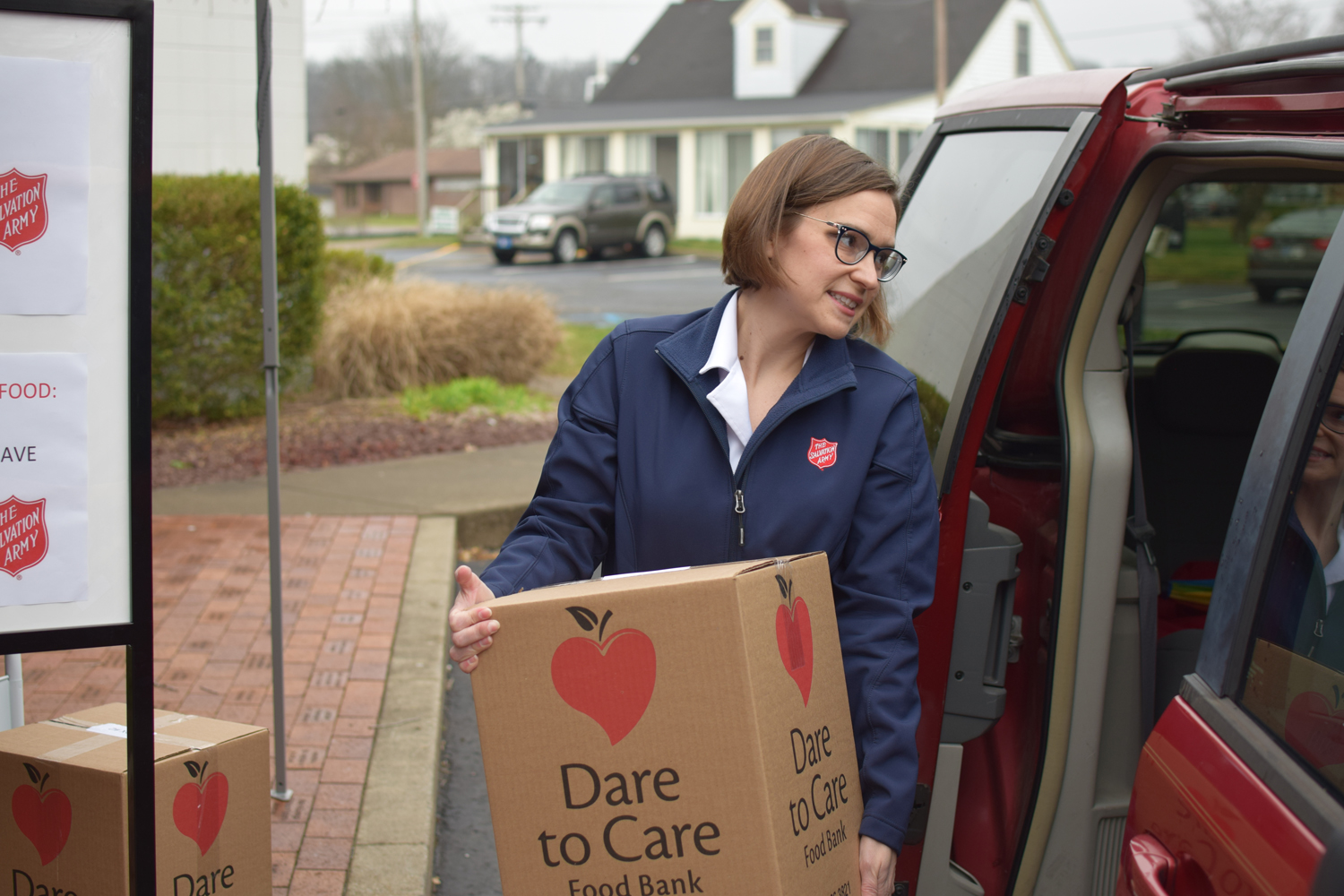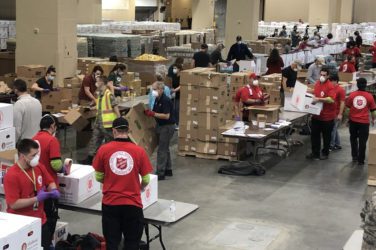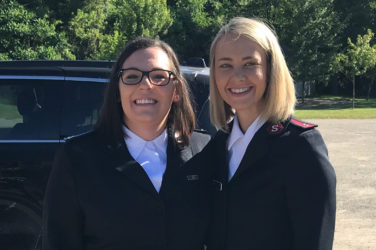A look at the territory during the COVID-19 crisis
During unprecedented circumstances resulting from the COVID-19 pandemic, Salvationists in the Central Territory have put their faith into action, showing care and compassion, selflessly serving their communities, trusting in God and sharing their hope in Christ.
“In the midst of these uncertain days, God is giving us the opportunity to reach out to others with a living hope,” said Territorial Commander Commissioner Brad Bailey in a video message of reassurance with his wife, Commissioner Heidi Bailey, to Salvationists.
At Territorial Headquarters a Territorial Coronavirus Response Team, led by Lt. Colonel Paul Smith, assistant chief secretary, was established to review information, share updates and resources, and assist in the dissemination of important information and guidelines.
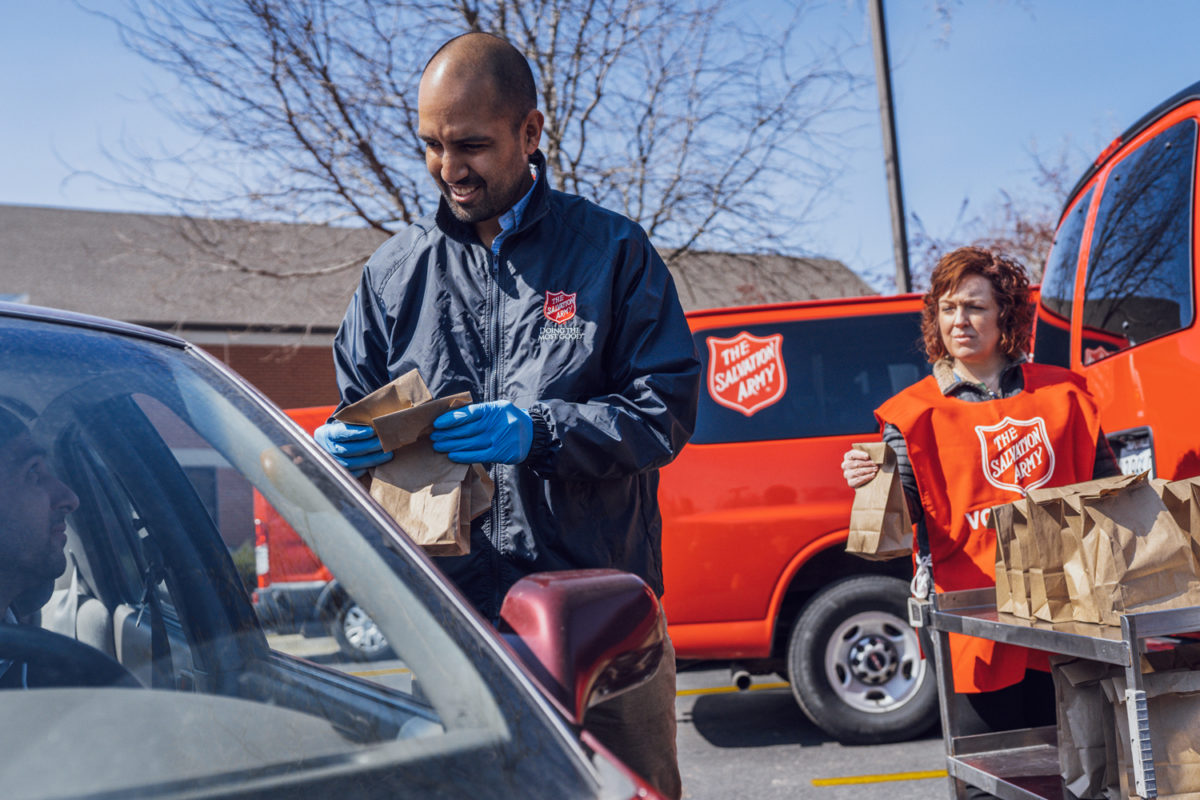
To help prevent spread of the disease, travel has been suspended and events have been cancelled. Units have implemented rigorous sanitation measures and social distancing protocols and have altered ways in which work occurs, service is given and connections are maintained. For instance, officers and employees at territorial and divisional headquarters have worked remotely to support ministry except having essential skeleton staff onsite when needed.
They also have introduced new means of service like a hotline set up by the Kansas and Western Missouri Divisional Headquarters in Kansas City, Mo., that sends calls to the phones of 10 trained EDS emotional and spiritual care chaplains who encourage, pray with and refer callers to Salvation Army services.
At the College for Officer Training staff, cadets, officers and their families have been primarily sheltering in their apartments but are not stagnant. Learning has continued via videoconference and small groups for classes, while social media provides for ongoing communication and fellowship.
Earlier as concerns regarding the spread of the virus and its impact were only beginning, the Biblical Education Tour continued to Israel. Major Cherri Hobbins, territorial officer resource development secretary, and Rob DeGeorge worked with the tour company, Educational Opportunities, to keep 74 officer and soldier delegates safe while maximizing their days. Though prevented from visiting Bethlehem and Jericho which were closed to non-nationals, they were able to substitute other important sites. There were tense moments at the tour’s conclusion as travel arrangements were dropped by the airline.
“As we prayed in faith, Educational Opportunities worked tirelessly with the airlines to arrange new tickets so that everyone returned as anticipated to the United States,” said Major Cherri. “We certainly testify to the continual presence of the Lord in our journeys.”
Upon return, delegates underwent screening and then all were asked to quarantine for 14 days.
At O’Hare International Airport Metropolitan Division Emergency Disaster Services (EDS) for seven weeks has provided thousands of snacks and bottled water to passengers undergoing screening by the Centers for Disease Control and Prevention (CDC).
The City of Chicago designated The Salvation Army as the lead agency for mass care, including feeding and social services. The Metropolitan Division’s comprehensive service plan includes a readiness to provide food to individuals considered among the most vulnerable in quarantine, supporting first responders with food and bottled water, distributing food boxes from 15 food pantries, establishing an 800-number for emotional and spiritual care, and offering assistance such as funds to offset cost of rent and utilities due to lost wages.
“The health and safety of the people we serve is our top priority. We are here to provide hope and help to our neighbors in Chicagoland during this uncertain time,” said Commissioner Barry Swanson, Metropolitan divisional commander.
At the Chicago, Ill., Freedom Center there’s a new normal as they follow protocols they’ve practiced for just such a time. Inside the center staff and residents follow procedures set by the CDC and local health professionals, the lounge is closed, mealtimes have been staggered and visitation by guests has been suspended. Outside the center, staff and volunteers continue to assist the homeless daily with increased food service, and The Salvation Army is working with the city and others to provide sanitizers and washing stations for the homeless to access.
“We are prepared and taking precautions and acting as responsibly as possible,” said Major Nancy Powers. “But this is our time to shine, to show Jesus’ love to a fearful, hurting world.”
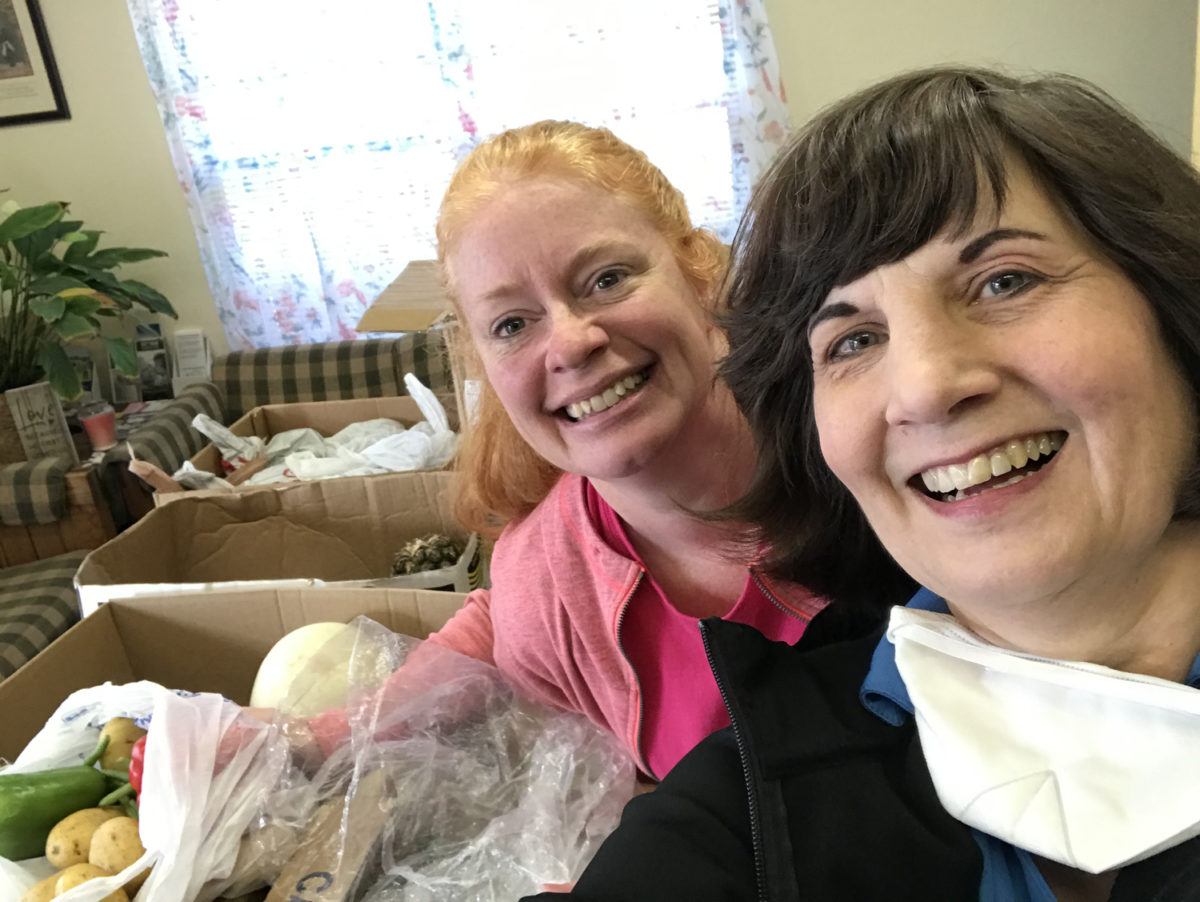 Major Beverly Best, Kansas City Citadel, Kan., corps officer, who oversees multifaceted ministries that also have an extensive preparedness plan, including quarantine space, if needed, for residents in their housing programs, concurred, “I believe God has put The Salvation Army in place for such a time as this. We have a tremendous opportunity to minister to the most needy and spread the love of Jesus.” Among the many services they’re providing are a drive-up food pantry and financial aid using phone, text and email. The major’s signature plate now reads: Keep a distance. Wash your hands. Trust God.
Major Beverly Best, Kansas City Citadel, Kan., corps officer, who oversees multifaceted ministries that also have an extensive preparedness plan, including quarantine space, if needed, for residents in their housing programs, concurred, “I believe God has put The Salvation Army in place for such a time as this. We have a tremendous opportunity to minister to the most needy and spread the love of Jesus.” Among the many services they’re providing are a drive-up food pantry and financial aid using phone, text and email. The major’s signature plate now reads: Keep a distance. Wash your hands. Trust God.
At the request of the local sheriff, The Salvation Army in Grand Rapids, Mich., is serving as a dropoff site for donations of personal protective equipment like gloves and N95 face masks critically needed by health care workers and first responders. Chris Striebel, Western Michigan and Northern Indiana divisional EDS director, is overseeing the donations from the public every weekday from 9:00 a.m.–4:00 p.m.
Across the Midwest, corps have been engaged in the life-sustaining service of providing food. It’s been a game-changer for thousands like a young mother who came to the Warsaw, Ind., Corps clutching her two children. “I work in a restaurant and they have cut my hours in half,” she sighed. “I’m a single mom, and I don’t know how things are going to stretch even further.” Her eyes welled with tears as she received food, including fresh fruit. “I offered to pray with her,” said Envoy Ken Locke, corps administrator. “We bowed our heads and asked God to see us through.” After she left, an elderly couple knocked on the door. “We just want to help,” they explained as the envoy brought in bags of cereal, canned tuna, laundry supplies and soap from their car to restock for the next family in need.
Part of a Hunger Coalition and known for its excellent summer meal program for children, the Livingston County, Mich., Corps has been a natural for the community to turn to now to help ensure children, who normally receive school lunches, have the food they need.
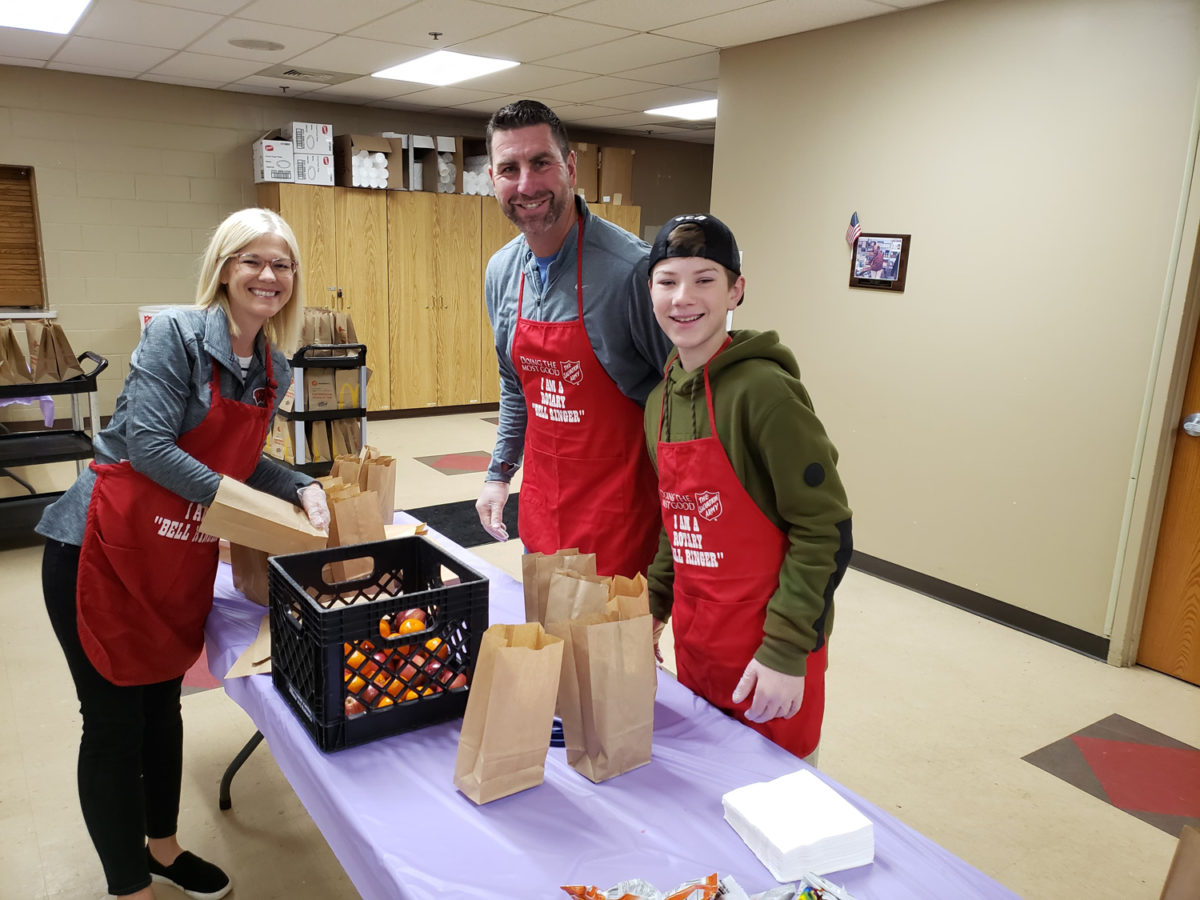 According to Major Prezza Morrison, corps officer, the EDS team which was established in the last year has been a Godsend as it enabled immediate service. To expand that service, the corps reached out to its Christmas and summer volunteers for help. All spots for volunteers were filled in just 30 minutes, and there’s a waiting list! Working in crews of just four with enough physical distance, they’ve had no trouble manning the canteen that goes to five locations. In the first three days, more than 300 sack lunches were distributed, and the Army was in conversation with the school system about the possibility of providing more than 600 food boxes once the school had finished its service program in March.
According to Major Prezza Morrison, corps officer, the EDS team which was established in the last year has been a Godsend as it enabled immediate service. To expand that service, the corps reached out to its Christmas and summer volunteers for help. All spots for volunteers were filled in just 30 minutes, and there’s a waiting list! Working in crews of just four with enough physical distance, they’ve had no trouble manning the canteen that goes to five locations. In the first three days, more than 300 sack lunches were distributed, and the Army was in conversation with the school system about the possibility of providing more than 600 food boxes once the school had finished its service program in March.
“We’re seeing people in need who’ve not turned to us before,” said the major. “I hope that when this is all over, we’ve all grown in compassion and learned lessons about generosity and giving.”
At the O’Fallon, Mo., Corps, they have been making wellness calls and delivering wellness boxes (a War Cry, a board game or craft, devotional, treats and toys) to their members. In lieu of her science experiment on Wednesday youth nights at the corps, Major AmyJo Ferguson, corps officer, began posting it to social media. The first post helped kids understand the spread of COVID-19 and the need to follow instructions to keep themselves safe and healthy. The major also encouraged youth to guard their hearts (Proverbs 4:23) and reach out to her or her husband to talk or for prayer. It was viewed over 950 times!
Many corps, like Norridge Citadel, Ill., have leveraged technology to minister to their congregations, like streaming services during the Lenten season, while others like Wichita Citadel, Kan., have held drive-up worship services.
Pathway of Hope (POH) case management has continued remotely. For instance, at the Fergus Falls, Minn., Corps, dedicated POH staff have been working with families via phone and email. Caseworker Breanna Grundmeier uses Google voice to send daily messages of inspiration and encouragement. Lt. Elysia Nordan, corps officer, has provided pastoral care over the phone, while her husband, Lt. Anthony Nordan, has made deliveries of toilet paper, cleaning supplies, diapers and wipes.
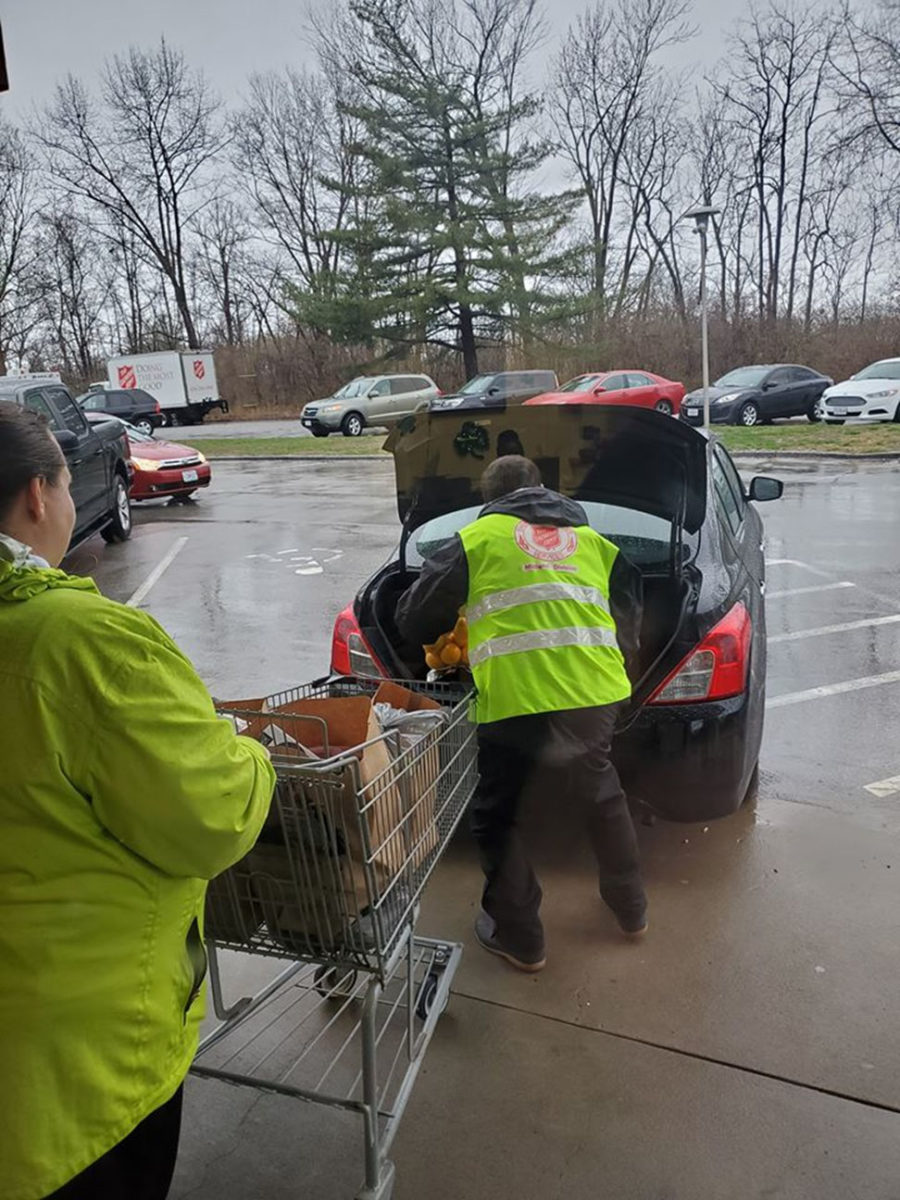 Though the six Ray and Joan Kroc Corps Community Centers across the territory had to shut their doors, officers and staff have found ways to stay connected with their members and communities.
Though the six Ray and Joan Kroc Corps Community Centers across the territory had to shut their doors, officers and staff have found ways to stay connected with their members and communities.
For instance, the Quincy, Ill., Kroc Center has been one of the designated drive-thru sites for the Quincy Public School System where parents have been able to pick up breakfasts and lunches for their children.
Creativity and service have remained hallmarks of the Omaha, Neb., Kroc Center, where a plethora of service has been undertaken to meet needs of all ages. They have made check-in calls and delivered essential items to senior members, and they’ve assembled more than 200 activity kits (science, reading and math activities, a book and toy) for children whose schools are closed. In the first few hours of drive-up distribution, they gave away 80 kits.
Each day Chicago, Ill., Kroc Center team members have been posting workout routines, dance and music instructions, Bible studies and updates on their website and social media; worship has been livestreamed on Sundays.
“We are still committed to serving our community and fulfilling the mission of The Salvation Army to the very best of our ability,” said Major John Pook, senior Chicago Kroc officer.
The 10 Booth Manors (independent living residences for lower income or mobility impaired older adults) have taken extra measures to help protect their residents.
“We recognize that we are serving a vulnerable population and want to do everything in our power to keep them healthy,” said Sarah Jakubowski, manager of the Oak Creek, Wis., Booth Manor.
In addition to continuously sanitizing public areas, staff have set up stations for easy access to hand sanitizer and disinfecting wipes. Group activities have been suspended, and residents have been encouraged to stay in place. Information, food boxes and other resources are delivered right to their doors. As importantly, staff are maintaining an open and reassuring dialogue with them during this frightening time.
“Whatever lies ahead,” said Sarah, “the staff and residents of Booth Manor will continue to work together to focus on our blessings and support one another in our efforts to stay healthy.”
At one of the territory’s premier senior programs, the Lakewood Temple Corps Day Care Program in Maplewood, Minn., staff are working hard to keep their senior participants engaged at home and to support their caregivers while the program is closed for the safety of this higher at-risk age group.
“Our day program is known for working with those who have frontal lobe disease. Engagement is very important to them, as well as a routine,” said NancyLee Dahlin. “Being at home isolates them and their engagement level goes way down. Without routine they lose their sense of purpose. Caregivers can only do so much, and their level of stress goes way up.”
Staff have been making wellbeing phone calls, even singing “Happy Birthday” to one participant who was overjoyed. They are developing and uploading videos of the center’s programming, including entertainment, worship and education, to their Facebook page. “Caregivers we have talked to are so excited,” said NancyLee, who also is looking at introducing a virtual support group for them.
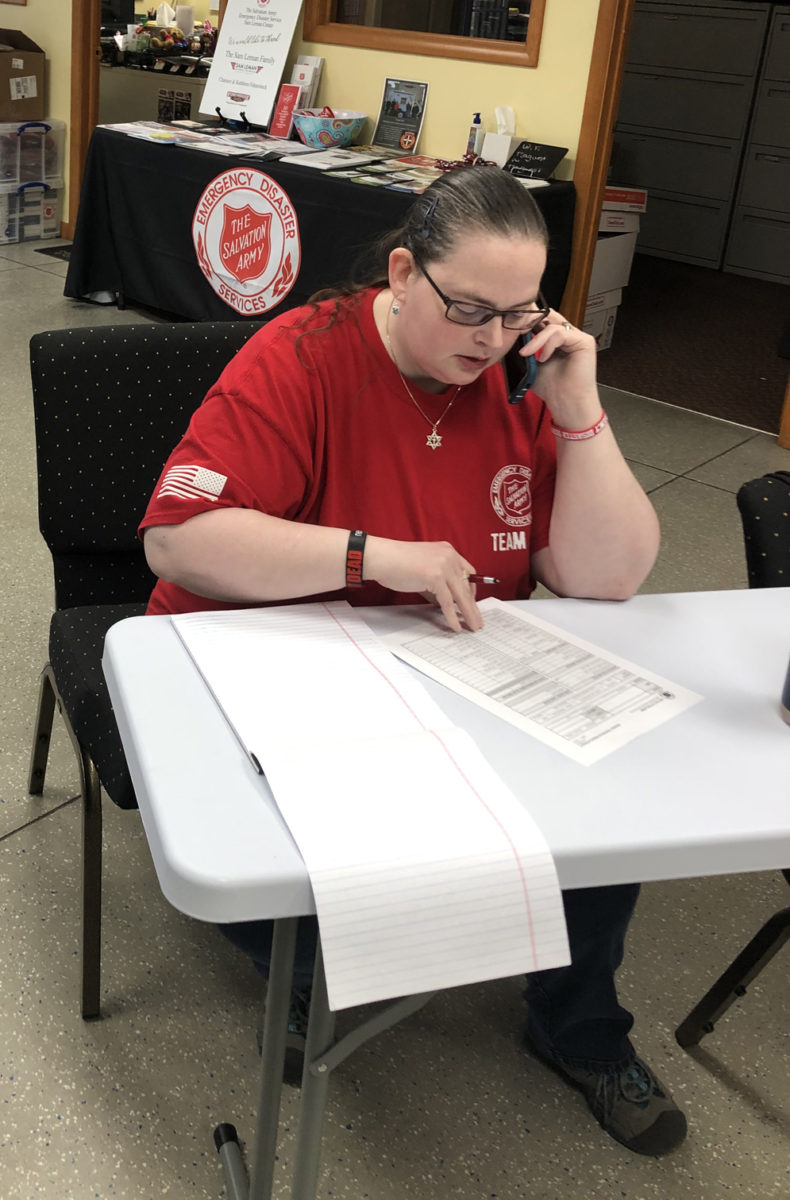 In Peoria, Ill., EDS sought to involve their volunteers, many of whom are older, in meaningful service to their communities through prayer and community care call teams. Within 24 hours of an appeal, the number of prayer teams more than doubled, going from 5 to 12 and resulting in more than 150 people interceding from their homes on topics compiled daily from corps, headquarters, families and individuals. In addition, EDS volunteers have made daily care calls, especially to older adults, checking to see if they are okay, sharing encouragement, offering prayer and referring them to the city’s 211 service for additional assistance.
In Peoria, Ill., EDS sought to involve their volunteers, many of whom are older, in meaningful service to their communities through prayer and community care call teams. Within 24 hours of an appeal, the number of prayer teams more than doubled, going from 5 to 12 and resulting in more than 150 people interceding from their homes on topics compiled daily from corps, headquarters, families and individuals. In addition, EDS volunteers have made daily care calls, especially to older adults, checking to see if they are okay, sharing encouragement, offering prayer and referring them to the city’s 211 service for additional assistance.
Sam Amick, Heartland divisional emergency services director, concluded, “We want to give a word of hope in this uncertain world.”
Report as of March 24, 2020

